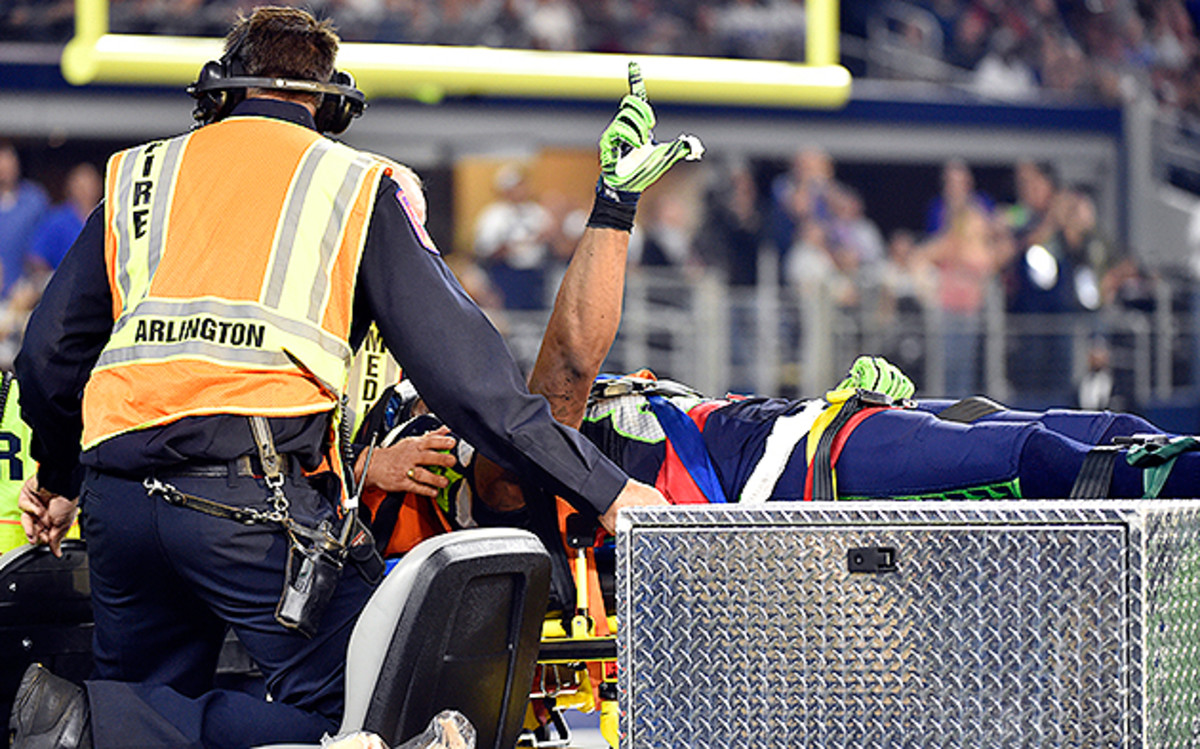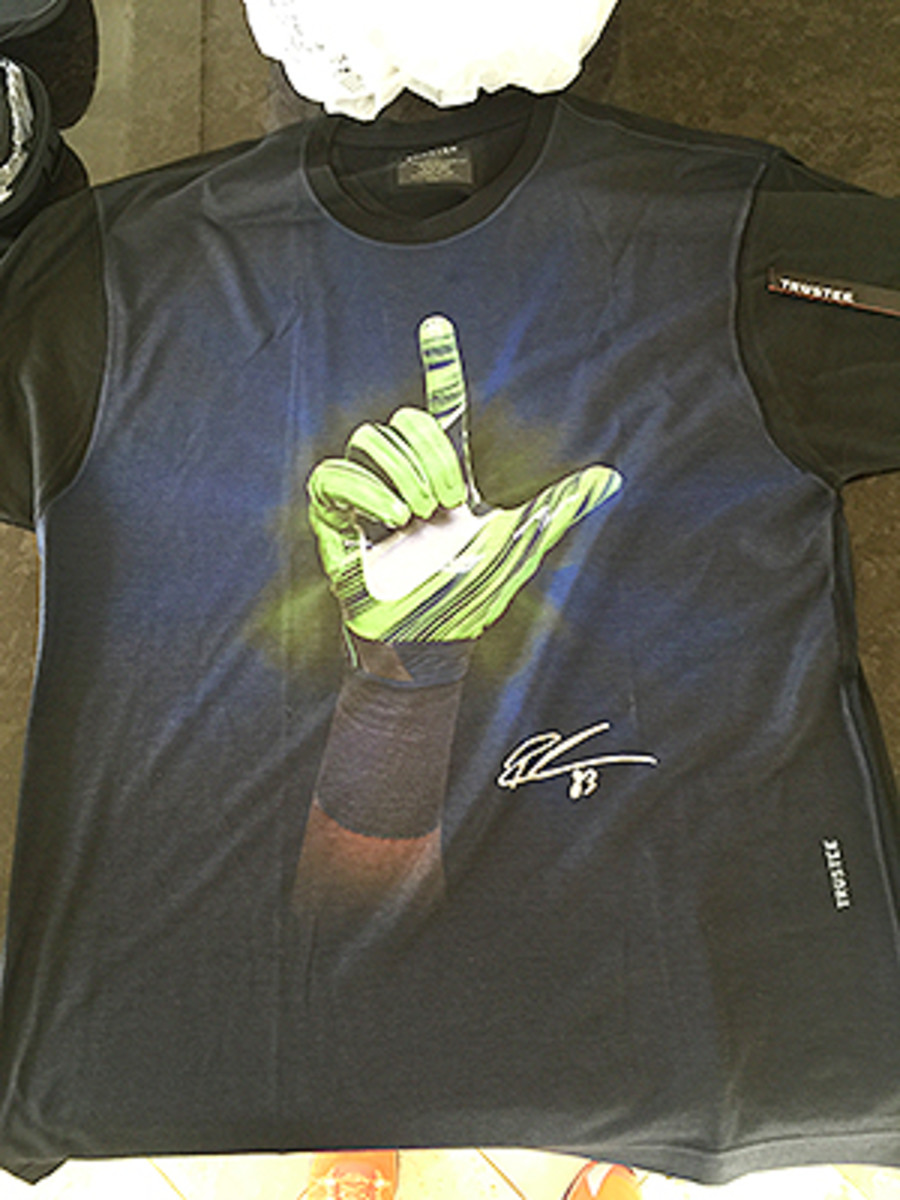After career-threatening injury, Lockette wants to return to football

On the play that landed Seahawks WR Ricardo Lockette in the hospital, Seattle was punting late in the second quarter of their game against Dallas on Nov. 1. Ricardo saw two Cowboys settle in front of him as he approached the line of scrimmage.
Lockette was surprised by what happened next: the defenders allowed him to release inside. He remembered grappling for position as he made his way down field. He even recalled seeing No. 38, safety Jeff Heath, just before Heath collided with him and upended him and left him crumpled on the turf.
“I just remember looking around and all the trainers running up,” Lockette told SI.com in his first interview since that play. “They’re checking my wrist, but I can’t feel it. I’m looking at them, but I can’t respond. I can’t talk. My entire body is numb.”
The Comeback: Tyler Eifert's journey back to the field after an elbow injury
While Lockette lay there on the field, his teammates circled around him. Many of them prayed. Some argued heatedly with receiver Dez Bryant and the Cowboys. Lockette’s voice started to come back. “That was 38,” he recalls saying. “Let’s get him.”
And then: “Don’t worry about me. I’ll be alright.”
And then, to quarterback Russell Wilson: “Win it for me, Russ.”
Doctors told Lockette to stay down, to relax, to remain still. Officials brought a stretcher onto the field at AT&T Stadium, along with a motorized cart. Lockette said he heard none of the arguments around him. At that moment, he insists he was not thinking about his career, his injury or the surgery that lay ahead. At that moment, Lockette kept insisting that trainers cut the athletic tape off his right hand. As he was carted off the field, he wanted to flash an L, to symbolize the Seahawks’ mantra, Love Our Brothers, or LOB.

“I wanted to let the boys know, we do this for our brothers,” Lockette said. “That’s what it means to us. We play for each other. We have each other’s back. I couldn’t tell them anything on my way off the field. I had to give a sign. And there’s no better sign than LOB.”
The Seahawks did win that game for Lockette, 13–12. Heath drew a 15-yard penalty on the play for a blindside block. Bryant drew the ire of several Seahawks, although he later angrily denied saying that Lockette deserved the hit. But Lockette holds no ill will toward any of the Cowboys. He said he has not followed the Bryant controversy. He said that he has been in contact with Heath via text message. Heath told Lockette he was praying for him. Lockette told Heath that “you’re a great player” and “no hard feelings” and “keep playing like the warrior you are.”
That has been Lockette’s mindset: positive, without fail. He wants to return to professional football, but he’s not sure if will be able to. He’s stuck for six weeks in a neck brace. He’s watching this season go on without him. But, Lockette said, “It could have been worse. I’m just happy to be here.”

By “here,” he means alive, and in Seattle, and ready to raise the 12th Man Flag on Sunday night before the Seahawks play the Cardinals. He expects CenturyLink Field to shake around him, the noise deafening, his brothers on the field down below.
After the hit, Lockette spent 11 days in Dallas. He had suffered ligament and disc damage that required neck surgery, which he had at Baylor University Medical Center. Lockette said he said he does not remember what type of surgery or what vertebrae were involved, only that before he went under what he wanted was “to walk or run again.” It was that serious. “I wasn’t thinking about football,” Lockette said.
Three of Lockette’s teammates stayed with him in Texas—running back Marshawn Lynch, left tackle Russell Okung and safety Steven Terrell—along with his girlfriend, Jamaica, and several family members. That meant a lot to Lockette. They were there when doctors pronounced the surgery successful, when Lockette awoke and had movement in all of his extremities. In fact, he said he’s doing better than the doctors initially expected. They don’t him to do anything, basically, other than rest. But he’ll still do whatever mundane tasks he can, like walking around the room, or fetching his own drink.
“I think they expected me to be walking around in a walker or whatever,” Lockette said.
Putting a Giant back together: How Jason Pierre-Paul got back to football
The support was overwhelming. The 12s flooded Lockette’s hospital room and the Seahawks’ facility with flowers and gifts and cards. Some sent actual rockets painted in team colors. Others told their own personal stories of recovering from severe injuries. Wilson sent Lockette daily text messages. Receiver Doug Baldwin called Lockette every chance he could.
Lockette began immediately with basic rehabilitation, like walking down the hallway in the hospital, or lifting his arms over his head. He said his brain did not feel foggy in the aftermath of surgery. “I felt normal,” Lockette said.
On Nov. 5, Lockette was released from the hospital, and as the van he rode in drove through Dallas, he noticed dozens of homeless gathered outside. He told the driver of the van to stop. He knew that he wanted to help the people he saw outside the window, and he went to a local McDonald’s and purchased 100 cheeseburgers to hand out. Just days before he wondered if he would walk again. But this, Lockette said, “felt better than any touchdown I’ve ever scored.”
“The feeling was pure joy,” he said.
Ron Wolf talks Al Davis, Brett Favre and his Hall of Fame football life
Last Monday, Lockette boarded a private plane and flew to Seattle. Paul Allen, the Seahawks' billionaire owner, welcomed him back on Twitter. The Lockettes listened to Kenny G’s Christmas album and ate crab cakes and baked chicken with rice. No one lamented the lost season. “We discussed how blessed we are to have each other,” Lockette said. “It makes you appreciate the smaller things in life. Things that are much bigger than football. Much bigger than this.”
As for whether he will play football again, Lockette is hopeful but uncertain. That is without any doubt his goal. He does have a timetable for how long the rehabilitation will take. He has to see how his neck responds. “I have to get back normal function,” Lockette said. “I have to keep progressing. Once that’s done, I can get back in the weight room.”
Upon his arrival in Seattle, Lockette went to the team’s facility. That was overwhelming, seeing all his brothers, the tears in their eyes, knowing how much they meant to him. “Oh, man, it was more than I expected,” Lockette said. “It was the ultimate welcome. I’ll never forget that the rest of my life.”
